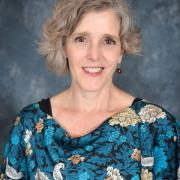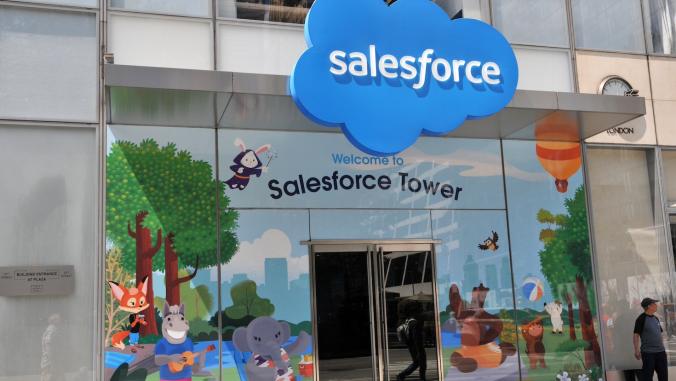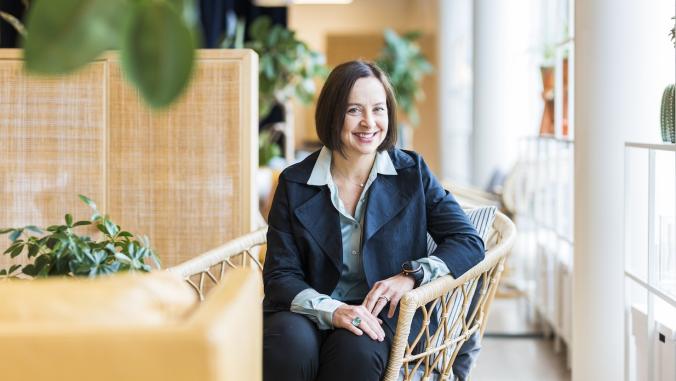Erica Hauver, Hitachi Energy Solutions VP, on shifting the discussion
The social innovation champion led the 106-year-old brand's microgrid strategy. Here's why moving beyond "box-ticking" and honesty matter to her.

Erica Hauver championed social innovation, the idea that technology can play a role in solving the world’s most pressing problems, since long before she started using that phrase on the job. As a senior vice president for Hitachi, she has a formidable platform from which to advocate that vision.
For the past 16 months, Hauver has been responsible for shaping the 106-year-old Japanese conglomerate’s strategy for microgrids. Now, she’s embedding that knowledge into the North American branch of Hitachi’s global energy solutions business. What shapes her business philosophy?
I spoke with Hauver about her early years with the nonprofit Special Olympics, the business case for microgrids and two big ways that Japanese companies treat sustainability differently from their U.S. counterparts. The interview was edited for length and clarity.
Heather Clancy: You started your career with a nonprofit organization, Special Olympics. What prompted your decision to switch to corporate sustainability strategy?
Erica Hauver: In my role at Special Olympics International, I was responsible for all corporate development activities. I was interacting with big global corporates all over the world, and through that role I got exposure into the very early stages of corporate sustainability, or at least expanding the aperture of social and environmental issues and how they're addressed in businesses from just compliance and philanthropy more to corporate responsibility.
I was seeing that early trend emerge as a result of my day job. I pitched the head of Fleishman-Hillard — which was, at the time, the world's largest communications agency — about creating a consulting practice focused on corporate responsibility and social and environmental issues, and they bought the idea and hired me to build it.
Clancy: What lessons can businesses learn from how non-profits approach strategy?
Hauver: The primary lesson, which I took actually into building the business for Fleishman-Hillard, was how animating having a social or environmental mission or purpose at the center of your organization can be in terms of attracting top talent and motivating employees to really excel day-to-day, week-to-week, year-on-year.
One sub-practice we built at Fleishman-Hillard was teaching corporates how to better define their mission as it related to having a positive impact on the world, and then communicating that to their employees and engaging their employees in that mission.
Clancy: What did you take away from your experience with PwC leading its sustainability strategy practice?
Hauver: As a result of being in that role, I had the privilege of consulting to the world's largest companies, and the CEOs and executive teams of those companies, to help them shape their level of ambition and their corporate strategies as it related to their social and environmental and commercial impact on the world.
In that role, I was able to work with many of the world's most advanced, most progressive, most ambitious companies when it comes to sustainability, helping companies and leaders of companies shift the agenda from asking the question, "How can we perform better socially, commercially and environmentally?" to "How can we drive positive change in the world given the platform that we have as a major global business?"
It was actually from that position and that perspective that when my family and I uprooted from London after 15 years to move back to the States, I really started looking around to see if there was an in-house role with a company that was right at the bleeding edge of how it defined sustainability and what it meant to the business.
That's when Hitachi emerged as a top candidate for me to make that move in-house. After consulting for the majority of my career, it became very important to me to actually roll up my sleeves and rather than advise, get in there and not just build a vision and a strategy, but help execute on it, because that's really where the hard work is.
Clancy: You’ve been very involved with Hitachi’s microgrid business. Where are they generating the most interest?
Hauver: The beautiful thing about microgrids — and this is why Hitachi moved into this business — is they tick all three boxes. They help customers reduce cost, reduce energy costs, they are a far greener alternative. Ours are renewables-based, so they're a greener alternative than purchasing your energy from the traditional grid. And they have a huge social benefit, which is that they keep going when the grid goes down.
For customers interested in the resilience issue, the Northeast and other parts of the country and the world where they're very vulnerable to natural disasters, there's a lot of interest. There's also a lot of interest from businesses that are just in parts of the country where the grid and their local utilities are not that reliable.
And there's interest just from customers to have either renewable targets or carbon emission reduction targets. So it's a trifecta of benefits, and customers typically will start with one and then be thrilled that they can achieve the others in terms of expressing their interest in a microgrid. But the Northeast is super-hot right now because it's got resilience challenges, vulnerability to natural disasters and high energy costs that microgrids solve for all of those.
For me, the guiding compass and the lens through which I make every decision is, 'Where can I have the most positive impact?'
Clancy: How do you help these organizations make a business case?
Hauver: We're offering microgrids as a service; there's no capital outlay for communities or businesses or universities or hospitals that are purchasing microgrids from us, because they're actually not purchasing the system, they are getting all of the benefits of a microgrid — the greener energy, the increased reliability. But they're also, in most markets, getting it at a lower price than they're currently paying for their energy.
So the business case isn't all that hard. In some markets where energy prices are lower, we actually still have customers that are willing to pay a little bit extra for microgrid services, because they're adding to their resilience, and they hugely value that.
Clancy: What can U.S. sustainability strategists learn from their Japanese counterparts?
Hauver: I work a ton with our parent company and I'm in Tokyo a lot, so I would say there's two major differences between Japanese companies and I would say U.S. companies — because actually I see more synergy between European companies and Japanese companies than I do U.S. companies.
Japanese companies take a much longer view of their businesses. Hitachi's been around more than 100 years; so have many U.S. companies, but Hitachi is not driving the business on a quarter-by-quarter basis, and that allows our executives to really take a look at the company's place in the larger world. That's really a different mindset that allows for different kinds of conversations, particularly around social and environmental goals.
The other difference, I would say, is that Japanese companies grew up on an island that is facing and has faced for decades many of the same issues that the rest of the world is now grappling with. Very big challenges from urban density and growth, extremely constrained natural resources, a big population — all the things that are driving global sustainability trends, Japan has experienced for many, many decades.
Clancy: What do you consider your biggest achievement to date?
Hauver: The ability to shift the discussion among corporate leaders and leadership teams about what sustainability means to their companies from a defensive box-ticking approach to a much higher degree of ambition and understanding of the business benefits.
I have a long list of very famous clients, but I'm not sure, given all my various confidentiality agreements and my consulting roles, that I can list them. But they would be all of the usual suspects that appear at the top of all of the sustainability rankings.
The beautiful thing about microgrids — and this is why Hitachi moved into this business — is they tick all three boxes. They help customers reduce cost, reduce energy costs, they are a far greener alternative.
Clancy: Who has been your most inspirational mentor?
Hauver: Eunice Kennedy Shriver, who founded Special Olympics. She's been an inspiration to me, not just during my period of working for Special Olympics, which was more than a decade, but ever since then. Just having that fire to achieve something that has a really, really large impact in terms of positive change in the world and on people's lives. That's the lens through which she lived her life, and I find that incredibly inspiring and motivating.
Clancy: What advice would you give to someone who's aspiring to a career similar to yours, someone who's either starting out or who's contemplating some kind of change?
Hauver: Let whatever it is that motivates you, that you're passionate about, be your guiding compass in every decision, whether it's day-to-day decisions or whether it's career change decisions.
For me, the guiding compass and the lens through which I make every decision is, "Where can I have the most positive impact?" That has led me to job changes, to career changes, but has also guided how I do consulting.
I'll give you one example. I had one U.S. client when I was based in London when I was working for PwC, and I had my first meeting with the CEO of that client. I was told by everyone, "They're a huge, huge client of PwC; do not say anything controversial to this guy. Don't make any waves; this is a big client."
The CEO opened the door and he said, "Tell me straight; what's our biggest sustainability challenge?" I could have played it safe, but in that moment we were sitting in a conference room and their products were displayed all over the conference room, and I said, "It's that 80 percent of your product portfolio is causing more damage than good in the world."
He decided to hire us based on that level of honesty. It could have gone the other way; but it was a moment of just tapping into that internal compass and it having a good outcome. That's happened repeatedly in my life.





